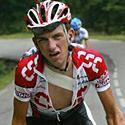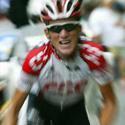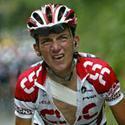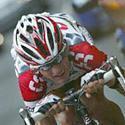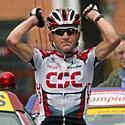
Recently on Cyclingnews.com |
An interview with Tyler Hamilton
A hero's welcome, and what's in store for 2004
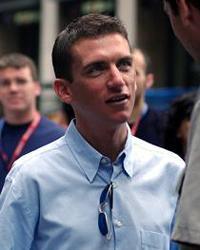 |
Back Stateside for a brief visit to New York, Tyler Hamilton, the man who appears to have a passion for pain, believes his well-rounded character has much to do with his sense of calm in the face of adversity - something the Man from Marblehead confronted and beat in this year's Tour de France.
Cyclingnews European Editor Tim Maloney sat down with a guy who, 10 years ago, never in his wildest dreams thought he'd be on the start line of the world's biggest bike race.
On the Monday morning after meeting New York Mayor Michael Bloomberg as the official starter of the New York City Cycling Championships, Tyler Hamilton told the Today Show's Matt Lauer that his gutsy fourth place overall and Pyreneean stage win in the Tour de France almost came naturally.
"It's a part of my character - I've always been a fighter", said Hamilton. "Whether it was playing baseball as a kid, or sailing or playing soccer, I've always fought on." Perhaps it's his tough New England grit, or an unusually high pain threshold, but whatever it is, Tyler Hamilton's superlative ride at this year's Tour de France certainly earned the label of heroic.
Cyclingnews: I understand that your trip to New York is your first time in the States in a while.
Tyler Hamilton: It's been the first time in the States since January 10th... it's a short trip but it's been good to be back.
CN: 2003 has been a big breakthrough year for you... wins in Liege-Bastogne-Liege and Tour of Romandie, and a stage win and 4th overall in the Tour de France despite a cracked collarbone. How's it all sinking in?
TH: Well the Tour hasn't sunk in 100% yet. We just finished last Sunday and it's been a busy week for me since. But it's been a fantastic year and it's a year I won't forget, that's for sure. In the sport of cycling, you do your best to get ready and then a lot of it comes down to luck and timing. I feel like I've had maybe a little bit of bad luck but a lot of good luck and made the right moves at the right time this year.
CN: At the post-race press conference after your Stage 16 win in Bayonne, you characterized the pain you had to endure during the first week of the Tour de France with your cracked collarbone as "brutal". How did the pain level compare with your broken shoulder in the Giro d'Italia last year?
|
|
|
|
|
|
|
|
|
|
|
TH: I mean... it's hard... they were sort of two different kinds of pain. With the collarbone, there was more of a sharper pain, and at the Giro fracture was more dull, constant pain. It's hard to compare which one I suffered more from. This year at the Tour, there was a little bit higher suffering level. But they were both difficult.
CN: What is your upcoming post-Tour de France program?
TH: My doctors tell me that for the next 10 days, I can ride, but only on the indoor trainer. They don't want me to feel the effects of the rough pavement so the bone can knit faster.
I also have to be real careful about pulling on the handlebars. After 10 days, I'll have another X-ray and normally I think it will be OK. Hopefully I can be in shape for the GP Zurich and after that, it's still kind of up in the air. Maybe the Tour of Holland, maybe the one-day races in Italy, which for me would be kind of fun since I've never done those before and I've heard a lot of good things about them.
CN: Like Coppa Agostoni and Tre Valle Varesine?
TH: Yeah, then I'll do the GP Eddy Merckx time trial and then we'll see what my race program will be. I've already had a pretty full year.
CN: Have you seen the profile for the Worlds TT course?
TH: Yeah, it looks very hard, but like I was saying before, I haven't committed to the World's yet. I'd like to but it's a long way away and it's hard to keep your fitness at a high level for so long. One option I've thought of is to prepare just for the time trial and skip the road race.
CN: Can you tell me how Bjarne Riis motivated you and the CSC squad at this year's Tour de France, especially after your crash on stage one?
TH: Bjarne is a great motivator; he was one of the biggest factors about why I stayed in the race. He's helped me so much as a rider; he's changed my career. I had focused on the Tour de France for 11 months and part of the reason I continued was for him. Bjarne had given me such a great opportunity at CSC, he had the whole team behind me and let me focus pretty much exclusively on the Tour de France. So part of me was doing it for Riis and I think his way to motivate me was also a big factor in how I won the stage in Bayonne, too.
CN: What does Riis say to you? What's the environment on the CSC team like?
TH: Bjarne is always very calm on the radio during the race and I think that's important... sometimes in a race, it's very stressful and a bit hectic. He talks your through things a lot... we had some difficult moments in the Tour and we always came out of it better. I like the way he does that; it's important.
CN: One moment at the Tour this year that seemed difficult for you and CSC was after the stage to Gap. You were in medical control for a long time after the stage, then the next day, you seemed very stressed at the start from all the traffic. That day, your teammate Jakob Piil won the stage to Marseille. How did that change the vibe on CSC?
TH: It was incredible... Piil's win was something we had been working towards all season. The biggest focus for the CSC team this year was the Tour De France. Last year, we went without a Tour stage victory and for Piil to win that stage pretty early in the race... to me, I felt like it took a little bit of pressure off of me and also for Carlos [Sastre] as well. For Piil, he deserved to win so much - the year before, he pulled his foot out of his pedal and lost a stage win in a three up sprint, which I think he would have won. I think Piil had been lamenting that stage loss for a whole year so for him to win was fantastic. He was pumped! Bjarne Riis says that Piil is one of most dangerous riders in the peloton and it's true.
CN: So as soon as the Pyrenees started, your buddy Carlos Sastre had an epic ride to win Stage 13 at Plateau de Bonascre.
TH: For Carlos to win a stage of the Tour de France, a race that he's been focused on all year too... I think I was just as happy as he was. Carlos has done a lot for me... in all the races I was successful in this spring, he played a big part of it. It was a victory for him and a victory for the team and a personal victory for me.
CN: If we just turn back the clock to 1999, to the Tour de France that year, you and Kevin Livingston played a key support role for Lance and was Armstrong's most faithful lieutenant until you joined CSC in 2002. What has the arc of that experience been like for you? Did you ever expect 10 years ago when you were NCCA cycling champ that your would be riding the Tour de France?
TH: Not at all! For me, if you look back at my career as a cyclist, I've made small steps forward every year since I won the collegiate championships in 1993. Every year. I've made a small step up, so back then, I wasn't even thinking about the Tour de France. When I first started cycling relatively seriously on the National team in 1994, never in my wildest dreams did I think I would have been on the start line of the Tour.
CN: So what would you tell a guy who is racing in the NCCA's now... what is the lesson for those riders?
TH: One lesson is that it's never too late to start cycling... I didn't start seriously training and racing until I was 21 or 22 years old. A lot of people believe that if you don't have it by the time you're 18, it's too late. But I think it's more important to enjoy what you're doing and slowly progress. The biggest thing is to enjoy cycling... you can't just start out when you get on the bike and say, 'OK, five years from now I want to be in the Tour de France.' Take it slowly and taking smaller steps is better than taking one giant leap. After a big, giant leap, you're going to come crashing down. I've seen that happen to a lot of riders in their careers. For me, I feel like I've been lucky to have progressed the way I have.
CN: So you have been racing seriously for 10 years; you're 32 now, so how much longer do you expect to be competitive at the top levels of cycling?
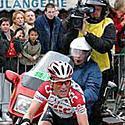 |
TH: It's hard to say... I've always said that I'd want to compete as long as I'm having fun. If racing at this level isn't enjoyable for me, it's not worth it. You have to make so many sacrifices in this sport that you want to enjoy it and have the passion for it. If you lose that, in my opinion, that's the time you should hang up your bike. I still have the passion for cycling... probably more than ever. My performance at the Tour this year has definitely sparked my passion more.
You know, I've worked harder this year than ever before and it gives me motivation now to go out and work just as hard if not harder next year. It gets me excited; when you get the results... people don't see how hard you work behind the scenes. You come home from training completely wasted, have something to eat and fall asleep, 10 or 11 hours. It's a sacrifice for me and a sacrifice for my wife, so it's difficult. But when you have a big result, it makes it all the hard work worthwhile.
CN: How did you interact with Lance this year during the Tour?
TH: We talked a little bit... as you saw, it was the fastest Tour in history, so there was not much time to chit-chat. There are some guys in the peloton I didn't talk to until the final stage of the Tour, honestly... but yeah, we talked a little bit and Lance had a great Tour and for one, his team was incredible. Incredibly strong, as you could see in the team time trial where he got a good gap on all the competition.
You know, Lance might say he was a little bit off this year, it's hard to say - maybe his competition was a little bit better - but Lance is so experienced at the Tour. He stayed calm at the difficult moments, like the day to Luz Ardiden. It was incredible; that morning, so many people from the media came up to me and were basically saying this was it for Lance. I didn't agree with them and sure enough, on Luz Ardiden, he made all those doubters zip it. For me, I was glad to see it, because he had a hard Tour de France.
For Lance, this year was probably the hardest of his five wins. I've been around for all five and was with him on three of them. Normally after the first time trial and first set of mountains, Lance had a comfortable lead and he could breathe easy. This year, it came down to the wire and he didn't crack under the pressure. Before this year's Tour, nobody knew if Lance could handle the real, real pressure. He never was under real, real pressure; the closest victory before this year was 1999 when Lance won by 6'02" over Alex Zulle. So this year's win by Lance shows he was stronger than everybody thought. He's got another side of him where he can handle the pressure.
CN: What about Ullrich? Some were surprised that with such little preparation and racing he was a strong contender for Tour de France victory.
TH: I wasn't surprised. He's been first once and five times second, but a lot of people didn't predict he'd be on the podium. But Ullrich had raced quite a bit in June, which is great for Tour preparation. I knew after the Tour of Switzerland that he would be better than expected in the Tour de France.
CN: What's it like to race with Jan Ullrich?
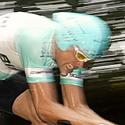 |
TH: He has an image of power... Ullrich is so, so powerful. He's got one of the biggest engines, if not the biggest engine in the world. Ullrich impresses me the way he can climb and time trial so well and he's been so good year after year after year. It's been unfortunate for Ullrich... without Lance, he might have been there to win the Tour 5 straight times. He's that good and Ullrich has shown over the years that maybe Lance has been a step above everybody else, but Ullrich has been a step above the next guy.
CN: Allow me to set the stage for the 2004 Tour de France. Lance comes back looking for a record 6 straight Tour de France wins, Ullrich is looking to unseat him... so where is Tyler Hamilton in that mix?
TH: I said after the Tour that I think this year has given me a lot of motivation for the future and a taste of, if I work hard, where I can end up. I'd like to be on the podium of the Tour de France next year. But you know, there's a lot of other guys that weren't factors this year that could be factors again next year, so there's no guarantees.
A guy like Beloki - a guy that would have normally been on the podium at the Tour - had an unfortunate accident; a guy like Botero just had an off year - but he could be back stronger than ever next year - I thought he was going to be on the Tour podium this year for sure. And there are guys that didn't even make it to the start line that could be back strong next year. Every year, it's a little bit different. But I'm confident in my abilities and I believe that if I train the right way and keep the same focus, I'll be there.
CN: Tyler, you and the CSC team work with Luigi Cecchini, an Italian sport medicine coach, or "preparatore" who was Bjarne Riis's coach as well as coaching Michele Bartoli and Alessandro Petacchi. What has he contributed to your progress as a rider?
TH: He's the trainer of the CSC team and he lives in Tuscany... he's changed my approach to training a lot, because I more or less came off US Postal with a diesel engine. I had a hard time with my accelerations, especially on the climbs. I could hold a high pace for a long time, but had a hard time going a little bit above that pace. My explosive power wasn't so good then. Cecchini and I started working on that last year, but as you know, it takes time to change a riders habits - I'd been riding for so many years, training a certain way for years.
I believe last year that I showed some improvement. In the Giro, I showed I could be competitive in a Grand Tour. Then this year, after training seriously through the winter, I was seeing that I was even stronger that in 2002. My first race this year was Paris-Nice and I was second in the prologue; right away, even if that was all I had done in the race, I would have been happy because I was training the right way.
Normally, for me, it was typical that I would be at the back [of the peloton] for my first three or four races. So Cecchini has given me a lot of confidence in my abilities. He used to coach Bjarne Riis and if you look at pictures of him before he was Tour champion, he was a bit heavy, but he got slimmer and slimmer. Your watts per kilogram is quite an important number and I focused a lot on that with Cecchini.
CN: So that's why you're having Diet Coke?
TH: Exactly! You can never let up your discipline and focus. You can give yourself a break once in a while, within moderation, you can drink a beer here and there, but when you put on 5kg, it's hard to lose it again, especially as you get older. For me, the off-season is always a struggle when you are not riding as much, you can put the weight on quickly. So you have to be just as serious with your time off the bike in October and November as you are when you're training. That's one of the things people don't realize. Not only do you have to train like a madman, you have to be so strict off the bike. It's important that your whole life revolves around the sport.
CN: But that 110% focus and discipline pays off.
TH: Yeah, it's true, it's true! In college, I drank more beer than you would believe! But I got to experience college life and most cyclists don't get to have that experience. So for me, I feel a lot more well-rounded... I went to school, got an education, drank a lot of beer... did that whole scene and it makes me a little more mature now, if that makes sense. Because I've been there and done that, I don't need to do it anymore.

